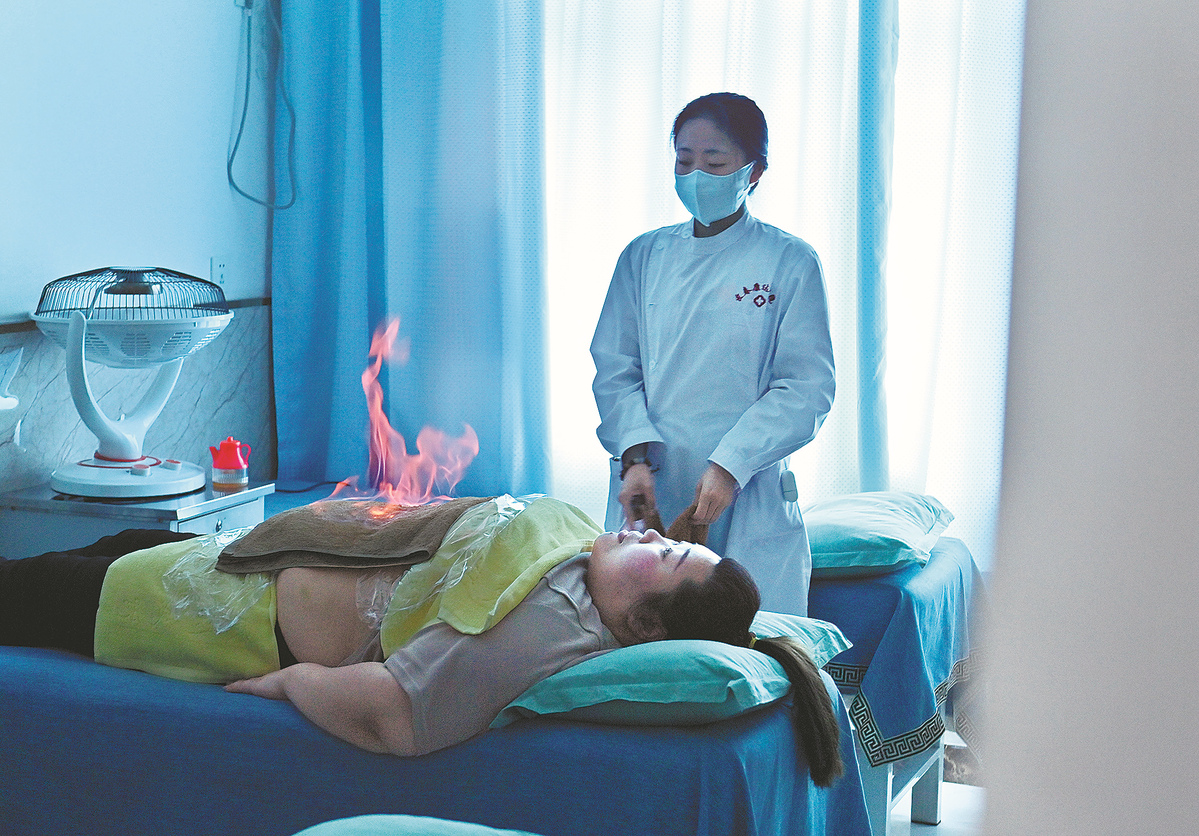Doctors prioritize diet and exercise and mental health

Last spring, Youyou (alias) felt embarrassed every time she entered the classroom and took off her coat. Due to her significant weight gain, she perceived herself as "very fat".
At 14, in the throes of puberty, she gained weight rapidly, rising from 39 to 65 kilograms and becoming overweight.
"By the summer vacation in the fifth grade, her weight gain was obvious — she even avoided being in photos," her mother said.
Youyou's physical activity had noticeably declined. She would be out of breath after climbing just three flights of stairs. Her personality also changed. The once cheerful young girl had morphed into a reclusive homebody.
Worried about the path she was on, Youyou's family took her to Wuhan Children's Hospital seeking help.
"In recent years, many children like Youyou have come to the hospital for weight loss. We evaluate each teenager's situation, and for high-risk patients who need timely intervention, we recommend or schedule them for further treatment at the obesity specialty clinic," said Feng Lifang, a doctor in the hospital's genetic metabolism endocrinology department.
READ MORE: Obesity rates soaring globally in 'monumental social failure', study says
Youyou's case was not complicated. After discussing her medical history and lifestyle habits, Feng prescribed lifestyle interventions that focused on improving her dietary structure, controlling portion sizes and increasing physical activity.
Through her own efforts and with support from her parents, Youyou reduced her weight to 59 kg by October of last year. She has since stabilized at around 58 kg.
Obesity among adolescents is becoming increasingly common due to the rapid hormonal changes that occur during puberty, said Feng.
"During this time, hormone secretion intensifies and the appetite grows. As a result, it is easy for adolescents to consume excess calories. Additionally, factors such as increased academic pressure, lack of exercise and insufficient sleep contribute to weight gain."

Rising obesity rate
According to the Report on Nutrition and Chronic Diseases of Chinese Residents (2020), the overweight and obesity rates among Chinese adults in 2018 were 34.3 percent and 16.4 percent, respectively — showing a steep advancement from the 2002 numbers of 22.8 percent and 7.1 percent.
For children and adolescents aged 6 to 17, the overweight and obesity rates were reported at 11.1 percent and 7.9 percent, respectively, also indicating a continuous upward trend.
In 2022, Wuhan Children's Hospital opened a specialized clinic for childhood obesity.
Between January 2022 and March 2025, around 16,700 patients sought treatment for obesity, with approximately 6,000 visits occurring in 2024 alone.
ALSO READ: Govt report: 20% of HK's secondary students overweight
Studies predict that if the trend of rising obesity rates is not effectively addressed, by 2030, the prevalence of being overweight and obese among Chinese adults and children will reach 70.5 percent and 31.8 percent, respectively.
The World Health Organization defines obesity as an abnormal or excessive accumulation of fat that negatively impacts health, which is typically assessed using Body Mass Index, or BMI.
In the adult population in China, the BMI categories are as follows: a BMI from 24 to below 28 is classified as overweight, and a BMI of 28 or above is classified as obese. For minors, the criteria for obesity vary based on age.
The effects of obesity on children and adolescents extend beyond physical appearance.
Yang Li, director of the department of endocrinology, genetics and metabolism at Jiangxi Children's Hospital, said that most children who visit the obesity clinic have health issues related to their weight.
Common clinical symptoms associated with obesity include fatty liver, early puberty, menstrual disorders, high blood pressure, sleep apnea and emotional issues.
Obesity can negatively impact the endocrine, cardiovascular, respiratory and digestive systems, which can, in turn, affect children's physical activity levels and bone development.
"Youth obesity is also a risk factor for multiple chronic diseases in adulthood," Yang said.

Time for action
In March, the National Health Commission called for concerted support for a three-year action plan to promote weight management among the public.
During the annual gatherings of the National People's Congress and the National Committee of the Chinese People's Political Consultative Conference, or two sessions, "weight loss" became a trending topic on social media.
Wang Xiaowen, director of the outpatient department at Wuhan Children's Hospital, said that while the prevalence of obesity among children is gradually increasing, parents' awareness of health is also improving.
"I believe this is a positive development. The medical approach for obesity is shifting from disease treatment to health management, emphasizing prevention before diseases occur, which I find very meaningful," Wang said.
READ MORE: Status battle for tall children hits new heights, and a few lows
"The consequences of obesity are numerous," Wang explained. "These include not only the 'three highs' — hypertension, hyperglycemia, and hyperlipidemia — but also high blood pressure, elevated blood sugar, high uric acid levels and high blood lipids, which can lead to cardiovascular and cerebrovascular diseases. This is an excellent opportunity to promote weight management across the country."
Medical institutions across China have taken significant steps in response to the growing obesity crisis.
On March 18, the Capital Institute of Pediatrics launched the Medical Weight Management Center.
In Jiangxi province, the Second Affiliated Hospital of Nanchang University established the Obesity Weight Loss Center, also known as the Jiangxi Province Obesity Alliance, which saw participation from over 20 regional hospitals.
Additionally, Jiangxi will introduce several multidisciplinary obesity weight loss clinics to offer patients comprehensive treatment plans for weight loss.
Liu Jianping, director of the Jiangxi center and head of the Department of Endocrinology and Metabolism at the Second Affiliated Hospital of Nanchang University, emphasized that managing obesity is a multidisciplinary effort.
She said, "The center not only involves the endocrinology department but also incorporates specialists from nutrition, rehabilitation, traditional Chinese medicine, psychology, gastrointestinal surgery and digestive health, creating a collaborative treatment model."
ALSO READ: China introduces guidelines to tackle student obesity
According to the obesity diagnosis and treatment guidelines released by the National Health Commission last year, a multidisciplinary team (MDT) treatment model can effectively enhance the diagnosis and treatment of obesity, providing personalized plans for patients.
Liu's hospital, like many others across China, opened three specialized clinics on March 18: an obesity and weight loss clinic, an obesity follow-up clinic and an obesity assessment clinic.
Six doctors are available for consultations three days a week, according to Liu.
"Now there are more overweight individuals than in previous years. From the beginning of the year to the end of March, our hospital has treated over 500 patients with obesity-related conditions," she said.
She also emphasized that adolescents and children require a multidisciplinary approach to address weight issues, as treatment for these groups demands more time and patience compared to adults.
For adults, lifestyle changes tend to yield better results due to their higher self-discipline and adherence to treatment plans. Liu noted that adults also benefit from a wider range of weight management tools, including the five government-approved weight loss medications available in China.
In contrast, childhood obesity is approached differently, according to Liu. Medical and surgical interventions, such as gastric bypass, are rarely advised. Instead, doctors emphasize professional dietary guidance and other behavioral adjustments.
The doctor also pointed out that minors are still developing physically and emotionally, making them more psychologically vulnerable. Obesity can lead to low self-esteem, and parents may not always fully understand their children's struggles. As a result, effective weight management for children requires a joint effort from parents, schools and healthcare professionals.
Recently, a 13-year-old girl came to see Liu for weight loss, weighing over 100 kg.
ALSO READ: Chinese people pursue healthy approach to tackling obesity
"When the child arrived, I noticed that she was reluctant to talk, and her parents struggled to understand her feelings. They focused on her weight, believing that she was too heavy and didn't look good. I told the little girl, 'With your fair skin, if you lose some weight, you could be quite beautiful.' After hearing this, she looked more confident and was more willing to talk," Liu said.
As time passed, the girl began to confide in Liu during her treatment, and "her confidence grew. I hope that parents and doctors pay more attention to the psychological well-being of children, as they are more sensitive and their emotional resilience is typically not as strong as adults".
During treatment, it is also essential to increase the variety and duration of exercise and to address sedentary habits.
Zhou Ying's daughter turned 18 this year and is in her senior year of high school. Last year, during a school physical examination, her weight exceeded 90 kg.
"My daughter has been slightly overweight since she was little. While living at school, she developed a fondness for drinking milk tea and eating too much meat, often indulging in unhealthy foods from outside, and was lazy about doing exercise," said the 52-year-old.
On April 14, Zhou took her daughter to Liu for help. In addition to adjusting her diet and receiving medication, Zhou decided to encourage her daughter to cycle and engage in more physical activity.
"She doesn't enjoy exercising, and after studying, she typically lies in bed playing on her phone. I decided to encourage her to be more active, so now we ride bikes together every day, covering a round trip of over 40 kilometers," said the mother.
"Surprisingly, she has embraced this routine, and it has slowly become a habit for her."

Holiday weight loss
Meanwhile, doctors generally agree that most weight loss in children occurs during holidays when they are less busy with schoolwork.
Many medical institutions have started offering weight loss training camps during winter and summer vacations to help children and adolescents lose weight in a healthy way. In 2024, Xiaotangshan Hospital in Beijing hosted one such camp.
The coaching team developed personalized training plans for each child, which included a variety of physical activities, balanced nutrition and psychological support.
According to a news release on the hospital's website, the children who participated in the summer camp lost an average of roughly 6 kg over the course of 28 days, demonstrating a significant improvement in their physical fitness.
READ MORE: Nutrition project gives rural kids enough food for thought
Since 2022, hospitals, including Henan Children's Hospital, Hunan People's Hospital and Nanjing Children's Hospital, have organized weight loss camps during winter and summer vacations.
"Physical weight loss for children and adolescents also requires attention to methods and approaches. Since they are still growing and developing, it's essential for them to engage in sufficient exercise, but not excessive amounts. Therefore, a more scientific approach is necessary," said Yang from the Jiangxi children hospital.
She also mentioned that hospitals in Jiangxi will increasingly utilize new technologies to improve the diagnosis, treatment and follow-up care for individuals with obesity.
"With the establishment of the Jiangxi Province Obesity Alliance, we are enhancing digital management. For instance, we will implement an app to collect all patient data into a unified database," she said.
"When a new patient registers online, we will, if necessary, match them with specialized nurses and nutritionists who will continuously monitor their weight loss journey. Additionally, we will incorporate AI for intelligent management to provide better support for obese patients," she added.


